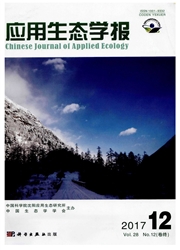

 中文摘要:
中文摘要:
为了研究宿主植物次级代谢产物对内生真菌生长的抑制作用,以药用植物茅苍术及其内生真菌为材料,采用有机溶剂萃取法提取茅苍术挥发油,应用滤纸片扩散法和平板涂布法研究茅苍术挥发油对茅苍术内生真菌及其他外源真菌的抑菌作用.结果表明:挥发油对3种内生真菌生长具有抑制作用;对酵母、水霉有很强的抑菌活性;对根霉、犁头霉抑菌作用不明显;对绿色木霉、黑曲霉的产孢具有抑制作用;对疫霉生长无抑制作用.在高浓度挥发油胁迫下,内生真菌菌丝分支增多,分支间距离变短,气生菌丝生长受到抑制.两种内生真菌对挥发油具有代谢转化能力,降低了其主要成分的含量.表明茅苍术挥发油对内生真菌生长具有限制作用,但内生真菌能够通过自身分解代谢适应茅苍术挥发油.
 英文摘要:
英文摘要:
In order to investigate the inhibitory effects of host plants secondary metabolites on the growth of endophytic and exogenous fungi, the volatile oil from medicinal plant Atractylodes lancea was extracted with organic solvent extraction method, and its antimicrobial activity against three species of endophytic and seven species of exogenous fungi was determined by paper disc assay and spread-plate. The volatile oil had inhibitory effects on the growth of test endophytic fungi. It had strong antimicrobial activity against Rhodotorula glutinis and Saprolegnia, but weak activity against Rhizopus and Absidia. It suppressed the sporulation of Trichoderma viride and Aspergillus niger, but no effects on the growth of Phytophthora. Under the stress of high concentration volatile oil, the hyphal branches of test endophytic fungi increased, the distance between the branches became shor- ter, and the growth of aerial hyphae was inhibited. The test endophytic fungi had remarkable ability to metabolize and transform the volatile oil, and decreased the contents of its main ingredients. All the results showed that the volatile oil extracted from A. lancea had inhibitory effects on the growth of endophytic fungi, but the fungi could adapt to the volatile oil via metabolizing and decomposing it.
 同期刊论文项目
同期刊论文项目
 同项目期刊论文
同项目期刊论文
 期刊信息
期刊信息
